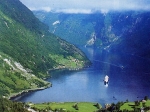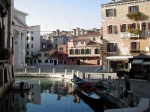
 The Portuguese Republic , or Portugal , is a democratic republic located on the west and southwest parts of the Iberian Peninsula in southwestern Europe . Portugal is bordered by Spain to the north and east and by the Atlantic Ocean to the west and south. In addition, Portugal contains several island territories in the Atlantic, including the Azores ( Açores ) and Madeira (including the Savage Islands ).
The Portuguese Republic , or Portugal , is a democratic republic located on the west and southwest parts of the Iberian Peninsula in southwestern Europe . Portugal is bordered by Spain to the north and east and by the Atlantic Ocean to the west and south. In addition, Portugal contains several island territories in the Atlantic, including the Azores ( Açores ) and Madeira (including the Savage Islands ).
A citizen of Portugal is usually identified in English by the noun and adjective Portuguese , but someone born in Portugal can also be referred to as Luso or Lusitano (English " Lusitanian ").
Portugal during the past 3000 years has witnessed a constant flow of different civilizations . Phoenician , Celtic , Carthaginian , Roman , Barbarian (Germanic) and Arabic cultures have all made an imprint in Portugal. During the 15th and 16th centuries, Portugal was a major economic , political , and cultural power. The overseas empire was prevasive across the world.
Geography
Continental Portugal is split in two by its main river, the Tagus (Tejo). To the north the landscape is mountainous in the interior areas with plateaus, cut by four breakings lines that allow the development of relevant agricultural areas. Portugal's highest point, however, is Mount Pico (2351m) in the Azores .
The south down as far as the Algarve features mostly rolling plains with a climate somewhat warmer and drier than the cooler and rainier north. Other major rivers include the Douro , the Minho and the Guadiana , similar to the Tagus in that all originate in Spain . Another important river, the Mondego , originates in the Serra da Estrela (the highest mountains in mainland Portugal - 1,991 m). The islands of the Azores and Madeira are volcanic in origin, and in the Azores, one to nine volcanoes are possibly active.
Climate
In mainland Portugal, average temperatures are 13ºC in the North and 18ºC in the South. Madeira and Azores, due to their location in the Atlantic , are rainy and wet, and have a narrower range of temperatures.
Portugal is one of the warmest European countries. Spring and Summer months are usually sunny and the temperatures very high during July and August, with highs in the centre of the country between 30°C and 35°C, reaching sometimes highs of 45°C in the southern interior. Autumn and Winter are typically rainy and windy, yet sunny days are not rare either, the temperatures rarely fall below 5°C, usually staying at an average of 10°C. Snow is common in the mountainous areas of the north. Portugal's climate is classified as Atlantic-Mediterranean.
Economy
Portugal has developed an increasingly service-based economy since joining the European Union in 1986 , a development that began with the boom of the 1960s . Over the past decade, successive governments have privatised many state-controlled firms and liberalised key areas of the economy, including the financial and telecommunications sectors. Today, Portugal is a developed nation. It joined the Economic and Monetary Union in 1998 and began circulating its new currency, the euro , on January 1 , 2002 along with 11 other EU members.
As of 2004 , economic growth has been above the EU average for much of the past decade, but GDP per capita stands at just 75% of that of the leading EU economies. Portuguese GDP grew 1.5% in real terms in the second quarter of 2004 compared with the same period in 2003 , by virtue of favourable domestic conditions. It benefited from investment and private consumer spending. Exports increased, but not in comparison with the strong growth of imports. In the same quarter the unemployment rate was 6.3%. In 2003 , GDP per capita shrank 1%, due to the stringent austerity measures imposed by the government, low rates of investment and an internationally weak economic climate.
The country still has a 6.7 percent illiteracy rate, mostly among the elderly. Portugal needs to advance structural reforms to boost the country's economic competitiveness. Portugal has been increasingly overshadowed by lower-cost producers in Central Europe and Asia as a target for foreign direct investment.
In the technology area, Portugal has one of the higher rates in the World when possessing a mobile phone (over 100%). Third generation mobile phones, UMTS , are being largely commercialized by operators since early 2004. Considering that 41% of the homes in Portugal had a computer in the first quarter of 2004, only 26% of the population had Internet at home; an additional 4% also used it. It is considered that in the near future most of the population will have access to the Internet via mobile phone.
Demographics
As of 2004 Portugal has 10.5 million inhabitants.
Portugal is a fairly homogeneous country linguistically and religiously. Ethnically, Portuguese are a combination of several ethnicities, primarily native Iberians , Romans , Celts , and Visigoths . Other elements are Moors , Suevi and Phoenician . Even so, Portuguese people are ethnically homogenous. The country is characterized by city, town or village cultural differentiation and there is virtually no regional affiliation, unlike other European countries. Portuguese is spoken throughout the country, with only the villages of Miranda de Douro 's Leonese dialect recognised as a locally co-official language. It is known as Mirandese . The closely related Asturian dialect in Spain is another Leonese dialect but not officially recognized by Spain.
Almost ten percent of Portugal's citizens are immigrants. Since the decolonization period, Portugal has received immigrants from the former African colonies, and from Europe (especially the United Kingdom , Germany and France - the climate, culture, and relatively low cost of living are the main attractions). Today, many Eastern Europeans (especially Ukrainians , Moldavans , Romanians and Russians ), as well as Brazilians , are making Portugal their home in search of a better life. Portugal, long a country of emigration, has now become a country of immigration.
The great majority of the Portuguese population belongs to the Roman Catholic Church . Religious observance remains very strong in northern areas, with the population of Lisbon and southern areas generally less devout. Religious minorities include a little over 300,000 Protestants , the most notable denominations are: the Assemblies of God , Christian Congregation in Portugal , Brethren Assemblies , Mana Church, Presbyterians, Methodists, and the Lusitan Catholic Evangelical Church. 50,000 Muslims (many of them from Goa , a former Portuguese colony on the west coast of India ), 10,000 Hindus (also largely from Goa), and 1000 Jews . A considerably larger number of people have some Jewish heritage, and although themselves Catholic, still observe some Jewish customs.




